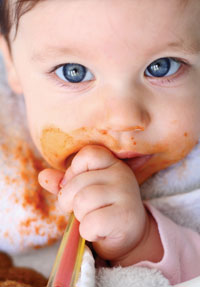 We all want the best for our babies; the best of everything, including their food. After all, we are what we eat, right? We all want to give our babies a diet that provides for optimal nutrition, healthy future eating habits - even refined tastes. So, how do we do this without spending all day in the kitchen?
We all want the best for our babies; the best of everything, including their food. After all, we are what we eat, right? We all want to give our babies a diet that provides for optimal nutrition, healthy future eating habits - even refined tastes. So, how do we do this without spending all day in the kitchen?
Madrona mom Carmel Drage thinks about this a lot. "I have had moments before every meal where I wonder what on earth I can feed my daughter that will be good for her and she will like," Drage laments. Yet, for a baby, 18-month-old Soraya has enjoyed a wide variety of foods, including ethnic foods, and jarred and fresh baby foods. Her parents try to introduce her to a variety of flavors and textures to help her develop healthy tastes. They even developed their own "guaca-baby" food made from avocado and beans.
According to Cynthia Lair, nutrition educator at Bastyr University and the University of Washington School of Nursing, and author of Feeding the Whole Family, Drage is on the right track. "We are training a baby's taste buds," says Lair. "If we feed them bland, processed food, we train them to like bland, processed food." She calls it the "macaroni syndrome. We train children to be picky eaters," she says, "by feeding them processed food. We buy into the myth that children require special, bland, processed food."
Food literacy
Seattle pediatrician Susanna Block says she created World Baby Foods as an antidote to the epidemic of bland baby food in the United States. Inspired by Block's travels overseas, World Baby Foods blends ethnic foods and puts them in a jar for portability and convenience. With options like Baby Borscht, Baby Dal and Lullaby Thai, World Baby Foods is not your average American baby fare. "The recommendations about bland foods are American-culture-specific," explains Dr. Block. "It's a concept of food literacy. You are actively teaching your child how to eat, just as you do with brushing teeth. Teaching your child how to eat healthfully is an important life skill."
Will ethnic foods in a jar create children with precocious and refined tastes when it comes to food? Despite the more complex ingredients in World Baby Foods, Ballard mom Jen Enich reports that her 9-month-old, Sebastian, enjoyed them all. "They all had a strong flavor of apples, though," reports Enich. "On the one hand, it made them taste mild and familiar to him. On the other, it didn't make them especially exotic, which was what I expected." If your baby already likes apples, this may be the perfect way to gradually introduce additional ethnic flavors.
Scientists believe that babies get a flavor of what their mothers eat, perhaps in utero through the amniotic fluid, but certainly through breast milk. This supports the concept of a "flavor bridge," which helps babies make an easier transition to food that is similar in flavor to what their mothers ate during pregnancy and while nursing. So, if mom enjoyed a lot of borscht, beets might be a hit. However, if mom never touched it, the flavor will truly be a new concept for baby.
Lair is skeptical about baby food in general. "We don't need to make our own ‘baby food.' We just feed the baby what we are eating," Lair explains. "There is nothing magical about baby food peas as opposed to peas, or baby applesauce as opposed to regular applesauce." Yet Lair admits that it can be hard to find suitable fresh, healthy food for babies when we are on the go. And it's hard to argue with the convenience of prepackaged, precooked food for that very reason.
Fresh and organic
Enter Homemade Baby, a fresh, organic baby food found in the refrigerator section of natural foods stores. Theresa Kiene, who calls herself Chief Executive Mommy of Homemade Baby, hopes to make fresh, organic baby food available to all babies. True to its mission, Homemade Baby donates 10 percent of all food it makes to charities that feed undernourished babies and families in need.
Homemade Baby food is manufactured in Culver City, Calif., and trucked around the country in refrigerated units. "We buy fresh fruits and vegetables directly from the growers," says Kiene. The company also tries to cultivate a relationship with its customers; there is a Homemade Baby tasting room in Culver City. "Because we were asking mothers to buy food in a way they never have before, we created a little area where moms could bring their baby anytime on a drop-in basis to try any food they want for free."
Among the first to enter this market of premium organic baby food, Happy Baby was inspired by the guilt of an overworked mother. Shazi Visram, founder of Happy Baby, offered a shoulder for a friend to cry on and listened to her story of how much she struggled with making homemade baby food for her twins. "She was crying and saying she felt like a really bad mom because homemade baby food was best and she couldn't keep up. She started buying the jarred food and she didn't like it at all," says Visram. "I had an interest in health and wellness . . . I realized we start our children out on processed food and wonder why they are obese."
Happy Baby is a national certified organic brand made in the Midwest and available at Whole Foods and Madison Market in the freezer section. With the support of Dr. Robert W. Sears, of the famous Dr. Sears family, Happy Baby blends organic fruits and vegetables with DHA and freezes them in ice cube trays, which allows parents to thaw individual 1-ounce servings.
"We actually encourage parents to make their babies' foods at home if they can," says Visram. "We have a free nutrition guide, co-authored by Dr. Sears, on starting solids. We also provide our own recipes to get parents started via download from our Web site. We created our products to offer an alternative to processed, jarred foods or for those who don't have the time to make homemade food, but still want to give baby the very best."
Some would argue that the best lessons we can offer our babies about food come from eating local, organic food, which reduces our carbon footprint and supports the local economy. Queen Anne's Eat Local offers baby food with that premise in mind. "All ingredients come from a few hundred miles," pledges Greg Conner, owner of Eat Local, which makes chef-prepared organic meals - such as soups, salads, entrées, and baby foods - for pick up or delivery. Originally a vendor of Seattle's Sprouts baby food, Conner worried about how to continue to serve families when Sprouts quit; now Eat Local uses Sprouts' recipes for its baby foods, branded Lil Locals. With six different types of baby food now in production, Eat Local plans to expand its baby food offerings in the near future.
The company is also committed to sustainability; customers can pay a deposit and use glass containers to take home meals. Eat Local also offers curbside pickup, a lifesaver for hassled parents of busy toddlers.
Tera Schreiber, former executive director of Great Starts Birth & Family Education, is a homeschooling mother of three and a freelance writer. As such, she feels grateful when she finds a healthy meal that her whole family appreciates - and when she can actually get it on the table.











